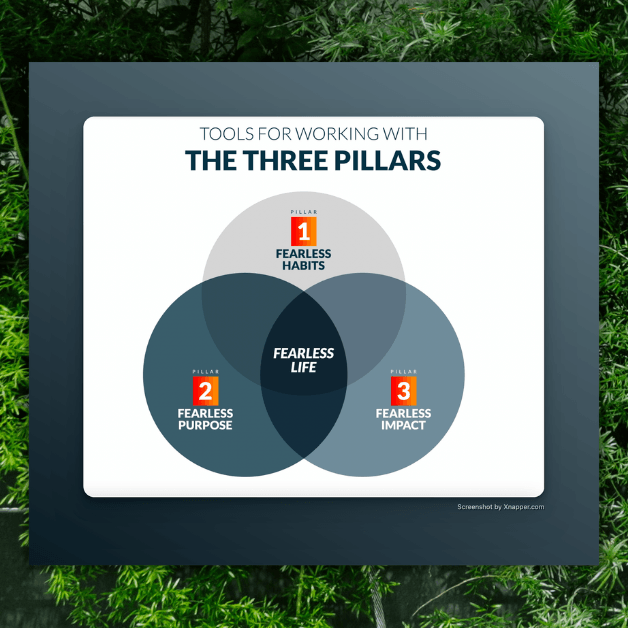By Leo Babauta
One of the most common things I see in people who write to me is something we all share: disappointment in ourselves.
We all feel this, because we constantly fail to live up to our standards:
- We aren’t as disciplined as we’d like.
- We don’t stick to habits we’re trying to create.
- We aren’t as productive as we plan to be.
- We leave small personal tasks and large work tasks undone.
- We fail in exercising as much as we’d like, and eating as healthily as we want.
- We fail in being the best parent, partner, friend, as we think we should be.
We should, we should, but we don’t. And that is frustrating and disappointing. We all feel it, so much of the day.
A friend of mine wrote to me about her disappointment in herself to do all the things she’d hoped to do, and I saw myself in her: I am never all that I hope to be. I constantly fail, like everyone else.
So what can we do about it? I’ll share some of the strategies I’ve been using lately to deal with this, and hope that this post can serve as a guide to all of us (myself included) in dealing with these difficult feelings.
Step 1: Noticing the Signals
The first step, as always, is awareness: pause right now and turn inward, to see if you are feeling frustrated or disappointed with yourself for anything.
Are there any goals you haven’t accomplished? Habits you haven’t stuck to? Eating you haven’t done perfectly? Relationships you’re not being good at? Skills you’d like to learn that you haven’t devoted time to? Errands or tasks that aren’t getting done? Projects that you’ve procrastinated on?
What kinds of feelings come up for you? These feelings are signals that you have expectations of yourself that you aren’t meeting. We all have them, all the time, and we can’t help but continually hope we’ll do better. These expectations aren’t realistic, but when we fail to meet them, we tend to think they’re realistic but it’s our actual selves that are the failure.
Step 2: Giving Yourself Space
Now that we see the signals, we want to give these feelings a little space. Allow them to be here in us, without trying to push them away, without wishing we didn’t have them.
Give the feelings a little breathing room.
How do these feelings feel in your body? Where are they? What kind of energy do they have?
See that you’re feeling bad (“suffering,” the Buddhists would say) and know that this is normal, and perfectly OK.
Step 3: Giving Yourself Compassion
If your friend were hurting like this, how would you comfort this friend? Could you give her a hug, some words of compassion, some love?
Take a moment and do the same for yourself. You are no less worthy of a hug, some love, some kind words. As silly as it might seem, tell yourself you deserve this compassion.
Step 4: See the Greatness of the Present
Now that we’ve comforted ourselves a bit, let’s change the story we’re telling ourselves.
The story so far has been: you aren’t good at X. (Whatever X is.) And so we feel bad about not being good at X.
Let’s turn from the self we haven’t been, to the self we have been. This self might have “failed” at X, but it has also succeeded in lots of other ways. This self has tried. It has gotten a lot done. It’s not perfect, but it has good intentions. This self has been the best it can be, even if that means imperfection. This self has cared, has loved, has strived for better, has made an effort, has wanted the best for others. Not always, but it has. This self deserves that kind of recognition, and love for being the best self it can be.
Now turn to the present moment: in this moment, what are you like? What about yourself, and the moment that you’re in, can you be grateful for? What is great about yourself, and the present moment, right now?
Step 5: Work with Curiosity
Finally, going forward, let’s practice tossing out our expectations of how we’re going to do today (and in life in general), and instead adopt an attitude of curiosity. We don’t know how we’re going to do at work, or in our relationships, or with our personal habits. We can’t know. So let’s find out: what will today be like? How will it go?
Be curious, in an attitude of not-knowingness.
It’s fun to find out things!
Yes, expectations will come up for us, and we will fail to live up to them, and we will feel frustration and disappointment again. This will happen, and this too will be a bit disappointing, because we want to be perfect at being curious and present. We’ll have to repeat the process when we notice this happening. That’s OK. That’s how it works – constantly renewing, never done.
But as we get better at this, I promise, we’ll learn to see things with a new curiosity, with a gratitude for every moment that we meet, and with a more loving and kind view of constantly failing but constantly striving selves. These selves are wonderful, and that realization is worth the ever-constant journey.
